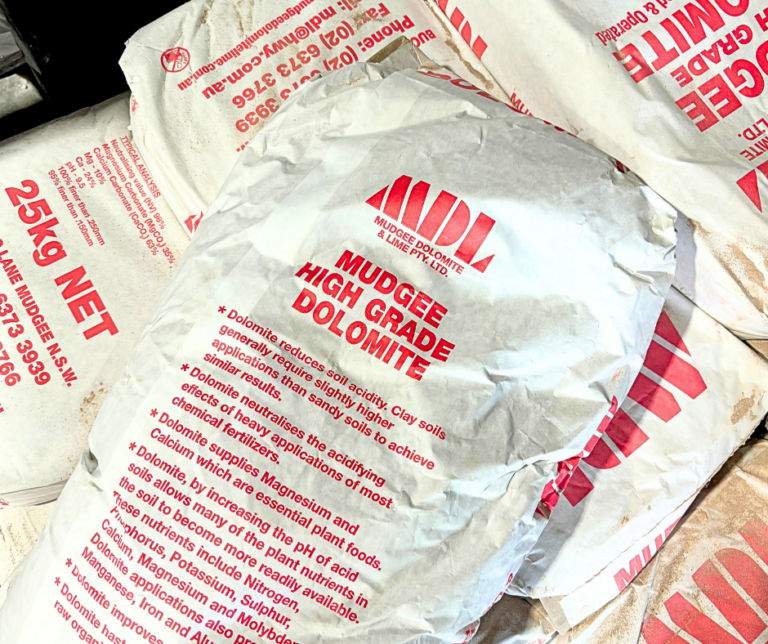Dolomite is essential in healthy plant growth. Whilst calcium is known for cellular health in plants and is found in ag lime, dolomite contains magnesium as well. This is the central mineral in photosynthesis. Magnesium becomes deficient in North Coast soils due to our high rain fall and the fact that magnesium is water soluble.
Here are some of the potential benefits of using dolomite in soil:
1. pH Regulation: Dolomite is known for its ability to neutralise soil acidity. In acidic soils, dolomite acts as a pH buffer, helping to raise the pH towards a more neutral level. This is particularly beneficial in regions where soil acidity is a concern, as it creates a more hospitable environment for plant growth. Balanced soil pH and improved soil structure resulting from dolomite application can enhance the availability of other essential nutrients in the soil. This can lead to better nutrient uptake by plants, promoting healthier growth and increased yields.
2. Improved Soil Structure: The calcium and magnesium in dolomite can also contribute to soil aggregation and structure. This can improve soil tilth, drainage, and aeration, making it easier for plant roots to penetrate the soil and access nutrients and water.
3. Long-lasting Effects: Dolomite has a slow-release effect, meaning its benefits can persist in the soil over an extended period. This reduces the need for frequent reapplication and provides lasting improvements to soil fertility and structure.
4. Crop Yield and Quality: Ultimately, the improved soil conditions resulting from dolomite application can lead to increased crop yield and quality. Plants grown in well-balanced, nutrient-rich soil are generally healthier, more vigorous, and more resistant to stressors such as pests and diseases.
5. Reduced Aluminium Toxicity: In acidic soils, high levels of aluminium can become toxic to plants and is often found in many synthetic fertilisers. Dolomite application can help reduce aluminium toxicity by raising the soil pH, thereby making aluminium less soluble and less available to plants.
It’s important to note that while dolomite can provide numerous benefits to soil, it’s essential to conduct soil tests before application to determine the appropriate dosage and ensure that soil pH and nutrient levels are within the optimal range for specific crops or plants. Additionally, dolomite should be used judiciously, as excessive application can lead to nutrient imbalances or other unintended consequences.
The Co-op can help you with your PH testing and choice of either our high quality ag lime and dolomite.




